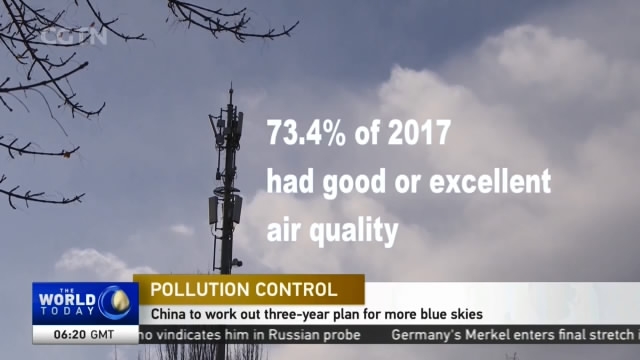
14:36, 04-Feb-2018
Pollution Control: China to work out three-year plan for more blue skies

China has planned to work out a three-year program for more blue skies across the country. At the National Environmental Protection Conference held in Beijing over the past two days, Chinese officials have pledged detailed measures to curb pollution and improve air quality. Meng Qingsheng reports.
China has seen more blue skies compared to five years ago. Data collected in key cities over the course of 2017, showed that over 73 percent of the year experienced good or excellent air quality. It's an increase of 7.4 percentage points compared with that in 2013. However, China's environmental protection authority says that's not enough. At a national conference, officials pledged that in 2020, cities across China will enjoy over 80 percent of good or excellent air days annually.
LI GANJIE MINISTER OF ENVIRONMENTAL PROTECTION "To achieve that goal, we need to ensure relevant departments feel the pressure and responsibility, and encourage them to be actively involved. It's like a doctor has prescribed medicine, and only after you take it can the disease be cured."
For next three years, the battle for blue skies will focus on three areas, including the Beijing-Tianjin-Hebei region, and the Yangtze River Delta. Authorities have rolled out measures for a structural readjustment to reduce air pollution. It will continue to promote cleaner energy for heating purpose in northern China, and phase out the use of coal-fired boilers. Efforts will be made to reduce road transports but increase railway deliveries. It will also regulate the excessive emissions of diesel-powered vehicles. China will restructure its fossil fuel power stations and the iron and steel producing factories to ensure low emissions.
MENG QINGSHENG BEIJING "Officials have highlighted a coordination mechanism between different regions of the country, to cope with air pollution emergencies. China will also carry out stricter top-down supervision programs throughout the year, to ensure that policies are properly implemented. Meng Qingsheng, CGTN, Beijing."

SITEMAP
Copyright © 2018 CGTN. Beijing ICP prepared NO.16065310-3
Copyright © 2018 CGTN. Beijing ICP prepared NO.16065310-3